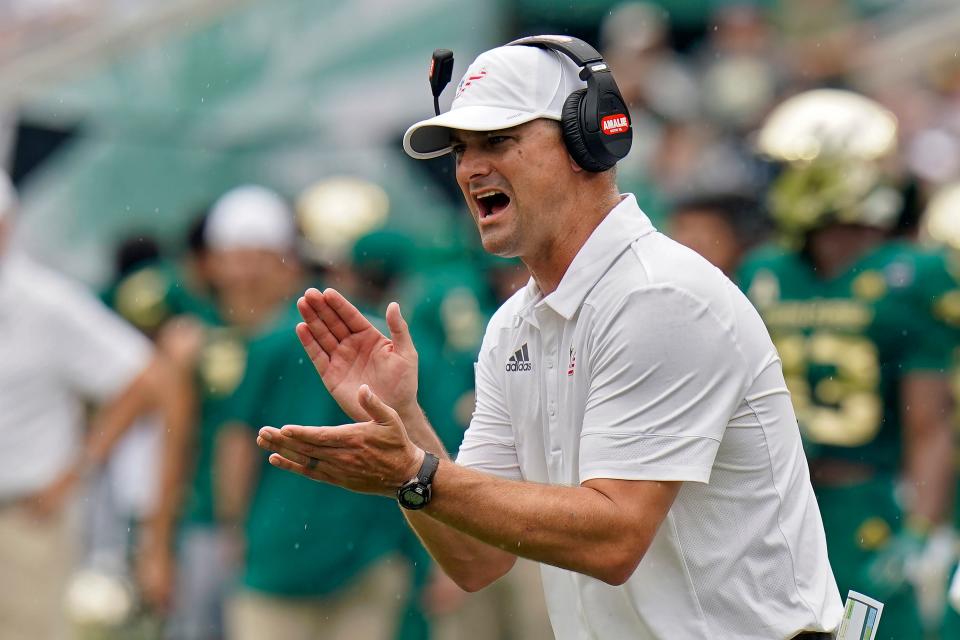ZIER: USF's Scott says a school's NIL ability will determine future success

They are called collectives, they are the wave of the future in college football, and without one, you have no future, University of South Florida head coach Jeff Scott says. Using the new NIL guidelines, collectives funnel money to players, paying them for playing, in effect.
"College football has completely changed from what it was a year and a half ago," Scott said. "Then, it was about facilities. Now, it's completely different. The No. 1 factor that determines your future success in bringing in talented players and retaining them, the very No. 1 factor, is your NIL ability, bottom line.
New QB: ZIER: QB Gerry Bohanon was a good get for the USF football program
New game: ZIER: With realignment, FSU and Miami are about to be irrelevant
"And that's maybe not the way we always did it, maybe not what we like, but the people, the programs that can adjust themselves and look at it as an advantage, have an edge. And that's the way I'm looking at it.
"If you don't have a good collective in place, if you don't have that support system, you'll see your guys leave because they'll be able to make more money other places," Scott said, a sense or urgency in his voice.
Former Lake Gibson High star Matt Grothe, who quarterbacked USF to heights it had never achieved before and has never achieved since, is all in on collectives. In 2007, Grothe quarterbacked USF to a 26-23 overtime win at Auburn that propelled the Bulls into the No.2 ranking in the country.

Grothe and former football manager Corey Staniscia have been instrumental in forming the Fowler Avenue Collective, which is using crowd funding to establish a platform to pay USF players for personal appearances, meet and greets, etc. Baylor transfer Gerry Bohanon is already on board.
For as little as $10 a month up to $200 a month, donors will have controlled contact with players. "The more you're in for the more access you have," Grothe said. Grothe expects the collective to be up and running within the next few months.
How many players will end up being involved and what they'll be paid is uncertain, but Grothe doesn't see that as a problem. "Clearly quarterbacks, running backs and receivers have a more visable public image," Grothe said. "They're going to get more money.
"But the Bucs don't pay everybody what they give Tom Brady. And we're going to do things with groups. We might have all the linebackers at a function, all the quarterbacks. So everybody benefits."
"For me, it's all about RDR," Scott said ... "recruit, develop and retain. And right now, NIL is going to have a direct impact on recruiting. You can't tell a kid, 'Hey, if you come here we're gonna give you this.' But what you can say is, 'Here is our collective, this is what we did for our players this past year.' If you don't have a strong collective, a strong link, then you have to say, 'Sorry, we don't have that.' Players choose schools based on that. That's just the new reality.".
"I think you're going to see big changes in college football over the next five, six years," Grothe said. "I think you'll have four, maybe five, super conferences. And there are certain schools out there that have the resources to get in. We have to make sure USF is one of those schools."
"I think for the very first time in college football, our fans and donors can legally directly impact the level of our success," Scott said. "In the past, you had to give money for facilities and hope that helped recruiting.
"Well, this (NIL) has quickly moved up to become the No.1 factor. We lost two young men we recruited to schools in a conference below us because of what they were gonna get there from the collective. Now, we have our own collective that our fans and donors can give money to."
All this gives Scott's program a good start, but to keep it going, there has to be a good finish, which translates into better results on the field. And in the final analysis, money alone won't buy that. It's on Scott to make it work.
This article originally appeared on The Ledger: ZIER: USF's Scott says a school's NIL ability will determine future success

